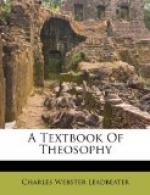If his longings have been such as need a physical body for their gratification, he is likely to suffer considerably. Such a craving manifests itself as a vibration in the astral body, and while we are still in this world most of its strength is employed in setting in motion the heavy physical particles. Desire is therefore a far greater force in the astral life than in the physical, and if the man has not been in the habit of controlling it, and if in this new life it cannot be satisfied, it may cause him great and long-continued trouble.
Take as an illustration the extreme case of a drunkard or a sensualist. Here we have a lust which has been strong enough during physical life to overpower reason, common sense and all the feelings of decency and of family affection. After death the man finds himself in the astral world feeling the appetite perhaps a hundred times more strongly, yet absolutely unable to satisfy it because he has lost the physical body. Such a life is a very real hell—the only hell there is; yet no one is punishing him; he is reaping the perfectly natural result of his own action. Gradually as time passes this force of desire wears out, but only at the cost of terrible suffering for the man, because to him every day seems as a thousand years. He has no measure of time such as we have in the physical world. He can measure it only by his sensations. From a distortion of this fact has come the blasphemous idea of eternal damnation.
Many other cases less extreme than this will readily suggest themselves, in which a hankering which cannot be fulfilled may prove itself a torture. A more ordinary case is that of a man who has no particular vices, such as drink or sensuality, but yet has been attached entirely to things of the physical world, and has lived a life devoted to business or to aimless social functions. For him the astral world is a place of weariness; the only thing for which he craves are no longer possible for him, for in the astral world there is no business to be done, and, though he may have as much companionship as he wishes, society is now for him a very different matter, because all the pretences upon which it is usually based in this world are no longer possible.
These cases, however, are only the few, and for most people the state after death is much happier than life upon earth. The first feeling of which the dead man is usually conscious is one of the most wonderful and delightful freedom. He has absolutely nothing to worry about, and no duties rest upon him, except those which he chooses to impose upon himself. For all but a very small minority, physical life is spent in doing what the man would much rather not do; but he has to do it in order to support himself or his wife and family. In the astral world no support is necessary; food is no longer needed, shelter is not required, since he is entirely unaffected by heat or cold; and each man by the mere exercise of his thought clothes himself as he wishes. For the first time since early childhood the man is entirely free to spend the whole of his time in doing just exactly what he likes.




